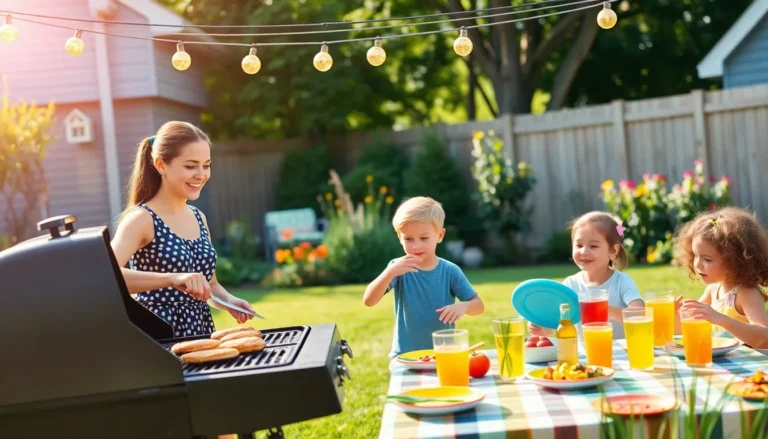Family traditions are the quirky glue that holds us together, often leading to laughter and a few eye rolls. From the annual holiday cookie bake-off that turns into a flour fight to the legendary game night where Grandma’s competitive spirit shines, these rituals create memories that last a lifetime. They’re not just about the activities themselves; they’re about the stories, the laughter, and sometimes, the epic fails that become family legends.
In a world that’s constantly changing, these traditions offer a comforting sense of stability and belonging. They remind us of who we are and where we come from, while also giving us a reason to gather around the table—or the couch—with our favorite snacks. So, let’s dive into some delightful examples of family traditions that might inspire you to start your own or perhaps rethink the ones you’ve been following all along.
Table of Contents
ToggleImportance Of Family Traditions
Family traditions strengthen bonds among members, creating lasting connections. Such rituals offer opportunities for shared experiences, which nurture relationships and promote communication. Engaging in traditions, like preparing meals together or celebrating milestones, fosters unity within the family unit.
These practices provide a strong sense of identity, as they often reflect cultural backgrounds and personal values. Observing family traditions can reinforce cultural heritage, ensuring that stories and customs get passed down to future generations. Celebrations, such as birthdays or anniversaries, infuse meaning into family gatherings and contribute to memories cherished for years.
Moreover, family traditions act as anchors in a chaotic world, offering routine and stability. They create a safe space where individuals can express themselves freely. Children benefit from the predictability of traditions, as it instills feelings of safety and comfort. They grow to cherish these moments, which helps build resilience as they navigate life’s challenges.
With the fast pace of modern life, prioritizing family traditions becomes essential. Families that engage in shared activities tend to report higher levels of satisfaction. Committing time to these rituals translates into deeper emotions and a greater sense of belonging, enhancing overall well-being.
Practicing family traditions encourages families to bond over shared goals, instilling a sense of purpose. As members learn to appreciate each other’s strengths, harmony and cooperation flourish. Each holiday celebration or game night serves to unify, creating cherished memories that define family life.
Examples Of Family Traditions
Family traditions manifest uniquely across households, with various practices fostering connection. Here are some examples:
Holiday Celebrations
Families often create special rituals around holidays, enhancing seasonal joy and togetherness. Families might gather for a Thanksgiving feast, preparing dishes that hold cultural significance. Many families host an annual Christmas celebration, complete with gift exchanges and festive decorations. Crafts like making homemade ornaments during winter celebrations encourage creativity and bonding. Celebrating the Fourth of July often includes picnics and fireworks, generating excitement and shared memories. Events like these contribute to a deeper understanding of family heritage.
Family Reunions
Family reunions provide an opportunity to strengthen ties among extended relatives, creating a sense of belonging. Organizing a reunion in a local park or a family member’s home can facilitate connection through shared meals and stories. Many families engage in fun activities like sports competitions or scavenger hunts during these gatherings. Each reunion often features a family tree display, highlighting lineage and history. Documenting these reunions with photographs ensures lasting memories, allowing future generations to appreciate their roots. Family reunions serve as an essential tradition, reinforcing connections across generations.
Rituals And Ceremonies
Rituals and ceremonies often mark significant milestones, reflecting family values and beliefs. Celebrations like birthdays may include unique traditions like special cakes or themed parties, making each occasion memorable. Graduation ceremonies connect family members through pride and encouragement, often involving shared gifts and celebrations. Many families partake in religious ceremonies, such as baptisms or confirmations, symbolizing spiritual milestones. Other rituals may involve volunteering together on holidays or participating in local charities. These actions nurture a sense of purpose and reinforce family values, contributing to shared identity.
Unique Cultural Traditions
Cultural traditions play a significant role in shaping family identities. They reflect diverse backgrounds and create shared experiences that unite families across generations.
Food Traditions
Food traditions represent a vital aspect of family culture. Families often gather to prepare specific recipes passed down through generations. Each dish carries a story, typically linked to cultural heritage. Many families celebrate holidays with signature meals, like tamales for Christmas in Mexican households or lasagna for Italian feasts. Recipes teach children about their ancestry while creating cherished memories. Shared cooking experiences foster teamwork, ensuring that recipes, secrets, and techniques endure. Cooking together not only nourishes the body but also strengthens family bonds, providing opportunities for connection.
Storytelling Practices
Storytelling practices transmit values and history within families. Each family typically has unique stories, often detailing adventures, challenges, or cultural legends. Grandparents frequently recount tales that showcase family wisdom. Many families gather for storytelling nights, encouraging children to share their perspectives. This ritual nurtures communication skills while building confidence in younger members. Each story not only entertains but also instills a sense of identity and belonging. By passing down narratives, families reinforce the importance of their unique culture and history, ensuring that memories thrive for future generations.
Modern Adaptations Of Traditions
Families adapt traditions to suit contemporary lifestyles. Technology plays a significant role in shaping these modern practices. Video calls replace in-person gatherings, particularly for distant relatives during holiday celebrations. Social media platforms allow families to share experiences in real-time, creating connections through virtual events.
Creative twists enhance traditional activities. Instead of solely preparing meals together, families may choose to explore international cuisines, discovering new recipes that reflect their diverse heritage. Members often engage in themed movie nights, where they watch films relevant to their cultural background, mixing entertainment with education.
Additionally, celebrations are increasingly personalized. Some families opt for unique themes during holidays, focusing on activities that resonate with everyone involved. For instance, a family might decide on a weekend camping trip instead of a standard Thanksgiving dinner, emphasizing experiences over possessions.
Seasonal traditions are also evolving. Families may participate in community service projects during the holidays, prioritizing giving back to those in need. This shift fosters a sense of purpose and collective responsibility among members, strengthening their bonds even further.
Utilizing technology, families create digital scrapbooks to document their unique traditions. Pictures and videos can be easily shared, allowing distant relatives to feel included in the experience. This adaptation preserves memories, ensuring that the essence of family traditions remains intact.
Cultural celebrations receive modern interpretations as well. Many families incorporate contemporary art forms into their rituals, blending music, dance, and storytelling. These practices breathe new life into age-old customs, making them relevant for future generations and cultivating a deeper understanding of their shared history.
Family traditions play an essential role in nurturing connections and creating lasting memories. By engaging in shared activities families can foster a sense of belonging and stability that enriches their lives. As they adapt these traditions to fit modern lifestyles they ensure that the essence of their heritage remains vibrant and relevant.
Whether through holiday gatherings or unique cultural practices these rituals bring families together in meaningful ways. Embracing and evolving traditions can lead to deeper relationships and a greater appreciation for one another. Ultimately prioritizing these practices allows families to cultivate joy and unity in an ever-changing world.



